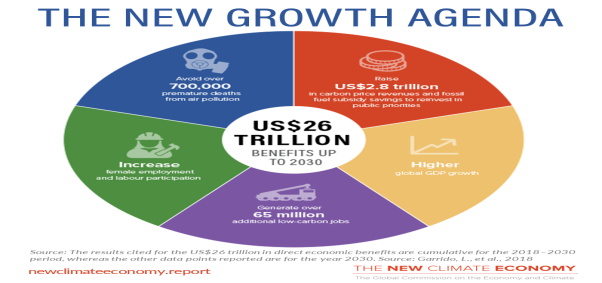Related Content
Now that the Paris rulebook is decided, leaders around the world should already be thinking ahead about how they can step up their country's ambition, writes Naina Lal Kidwai.
Business, cities and states can help prod countries’ governments to enact policies to reduce emissions, writes Paul Polman.
And by putting COP24 in coal-rich Katowice, the Polish COP presidency has pulled this essential but unglamorous pursuit to the top of the policy agenda, where it belongs, writes Sharan Burrow.
Governments and international institutions must help companies and cities accelerate this green transition, writes Naina Lal Kidwai.
It's clear that climate fatalists are wrong to suggest that we cannot afford to act. The reality is we cannot afford not to. In addition, there are growing examples that show why climate action is in the United States' economic interest, write David Vogel and Helen Mountford.
The climate story is, at its heart, a complex problem of better risk management over long-timeframes, with potentially catastrophic economic consequences from inaction, writes Caio Koch-Weser.
Multilateral development banks and other development finance institutions can provide the spark to ignite the new growth agenda, writes Ngozi Okonjo-Iweala.
New analysis is finding that bold climate action could yield a direct economic gain of $US26 trillion through to 2030, compared with business=--as-usual.
Climate action presents major opportunities in three key sectors of the global economy: cities, land use, and energy. If we seize these opportunities, argues Felipe Calderón, a more sustainable, inclusive, and prosperous future will be within our grasp.
It is a moral obligation and practical imperative to keep climate migration to a minimum, writes Felipe Calderón.
New research form the Urban Land Institute (ULI) and the Coalition for Urban Transitions shows that well-designed, compact cities are better for investors as well as citizens and the environment.
New paper highlights the synergies between aspirations for urban development and the imperative for climate action.
We need a concerted and coordinated effort to simultaneously develop new solutions and technologies in the shipping industry, writes Felipe Calderón.
Government strategies and innovative pilot projects can help passengers save money and benefit the environment, writes Naina Lal Kidwai.
From International Women's Day to Women's History Month, March is a good time to focus on gender equality -- and the need to support women who are the most vulnerable to climate impacts. Tackling this challenge is essential to creating a global sustainable economy, writes Rachel Spiegel.
Empowered women are not only critical for the environment, but also crucial to the global economy, write Kristalina Georgieva and Ngozi Okonjo-Iweala.
It is all our responsibility to ensure that a sustainable future holds a place for everyone, writes Sharan Burrow.
2018 must be a year in which governments, business, investors and civil society step up and publicly commit to enhancing their climate commitments by 2020, writes Helen Mountford.
In order to capitalize on the current rapid pace of urbanization and build thriving cities for all, national governments must ensure that transport and housing policies, in particular, support and enable cities, rather than hold them back, writes Rachel Spiegel.




















